- Home
- Nawal El Saadawi
The Fall of the Imam
The Fall of the Imam Read online
Nawal El Saadawi
The Fall of the Imam
Translated from the Arabic by
Sherif Hetata
TELEGRAM
To the four women I cannot forget:
To Shahbani Shiraz from Iran
Fatima Tag al-Sirr from the Sudan
Colette Itani from Lebanon
and I’tidal Mahmoud from Egypt
For what they have suffered and
for what they had endured.
To all the girls and boys who are still in their
childhood, or still in their youth
I dedicate this novel.
Nawal El Saadawi
Contents
Preface
The Search Begins
They Cannot Read
I Hear My Mother Calling
The Children of God
The Old Face of Baba
Only Once in History
The Chief of Security
The Legal Wife
Allah is on the Side of the Imam
The Bodyguard
The Two Faces
The First Letters in the Alphabet of Love
The Legal Wife will Not Go to Paradise
Statutory Treachery
Everything Happened Suddenly
Ecstasy of Love
When Love was Blind
Together in the Trench
Collective Fear
Eternal Love
The Great Writer
The Imam in Disguise
The Philosopher
My Old Love
Reviving Our Cultural Heritage
The Imam and Bint Allah
Coming to My Senses after the Ecstasy is Over
The Great Writer
Proof of Innocence
The Judge
The Grievance
The Superpowers
The Mother’s Vigil
The Latest Wife Meets the Illegitimate Daughter
Illicit Love
The Mistress
Gawaher
The Mother and the Daughter
The Trial
Glossary
Preface
When I was a child, I used to see God in my dreams. He had my mother’s face, the face of someone who is very just. Or He looked like my father, and then His features looked kind. My schoolfriend Fatima Ahmed also saw God in her dreams. His face was that of her father, sometimes that of her uncle. It was a cruel face, the face of a person who was very unjust.
I discovered that the face of God appears to all children. Usually He looks like their mother, sometimes like their father. The problem with God’s face is that neither children’s eyes nor those of grown-ups can see it. God can only be seen when we sleep, and His face has the features of those who are closest to us.
I tried to write this story when I was still a young girl in school, but all my attempts were in vain. The idea was in my head, and the characters, and the impressions. Everything was so vivid! Yet I could not find the words with which to tell it. It has lived with me since then, dogging my steps. During the last ten years it has given me no respite. The characters stared at me while I was awake, and even when I slept. If I travelled inside my country, or abroad, they were always there, watching me wherever I went. They were there when I met the Iranian Shahbani Shiraz who told me the story of her ‘little girl’, raped by her jailers. There with Fatima Tag al-Sirr, the Sudanese woman, when she took me to visit the ‘Association for People with Amputated Hands’ so that I could see her boy and his companions with their hands cut off at the wrist in accordance with Shari’a. There during the three months I spent with I’tidal Mahmoud and other young Egyptian girls in a prison cell.
The story quivered inside me every time I caught the familiar face of one of those rulers looking out at me from a photograph, his head partly showing from under a godly turban or a military cap, or his eyes watching me in a dream as I slept. It lived with me every time I travelled to Lebanon and heard the bombs of Hizb Allah (Party of God) echoed by the bombs of Hizb al-Shaitan (Party of Satan) from the other camp. It went with me to Mecca, stood by my side as I read ‘Welcome to the Guests of the All Merciful’.
Nawal El Saadawi
Cairo, February 1987
The Search Begins
It was the night of the Big Feast. They hunted me down after chasing me all night. Something hit me in the back. I was looking for my mother in the dark, running alone with my dog following in my tracks. Something struck me from behind. I turned round to face them, but they disappeared like frightened fish. They cannot look into the sun, cannot bear its light. They sleep all day and rise up at night. They do not know how to fight, have no honour, have no pride, they always hit you from behind.
Before I fell, before letters and words had time to fade, I asked them, ‘Why do you always let the criminal go free and punish the victim? I am young. My mother died a virgin and so will I.’
They said, ‘You are the child of sin and your mother was stoned to death.’
But before the letters could fade from my mind, before my mind became a blank, I said, ‘I am not the child of sin, I am Bint Allah. That’s how they called me in the orphanage. Even if I lose my memory, I cannot forget. I cannot forget my mother’s face. After I was born, she went to fight the enemy. She is a martyr.’
They said, ‘Your mother never knew what loyalty meant, neither to our land, nor to the Imam Allah. She died an infidel, and is burning in hell.’
I said, ‘Before the life blood leaves my brain and memory ends, my mother was never a traitor. Before I was born my father abandoned her and ran away.’
They said, ‘And pray who might your father be?’
And I said, ‘My father is the Imam.’
They screamed, ‘Not another word. May your tongue be cut out of your head.’
They cut out her tongue first. Later came the rest. For the Imam ruled according to the laws of God’s Shari’a. Stone adulterous women to death. Cut off the hands of those who commit a theft. Slash off the tongues of those who spread rumours about irradiated milk. Pour all bottles, all casks, all barrels of alcoholic drink, into the waters of the river.
On the eve of the Big Feast they slunk away before the spies of the Imam could see them, descended to the river and drank from its waters until their minds were blank. In the morning, suddenly awake, they got up, full of remorse, clamouring for mercy, since on the night of the Big Feast the Imam graciously pardons everyone. The doors of prisons and the concentration camps are thrown open, and out of them march the dead, the martyrs, the victims of nuclear radiation, the women stoned to death, the thieves who have one foot missing on the right and one hand missing on the left.
It was her turn to be free, but the spies of the Imam spotted her as she slipped out, trying to escape in time. They saw her running in the black of night with her dog close behind her. It was just before dawn. She had almost given them the slip when something struck her in the back. As she fell, the question echoed in her mind: Why do you let the criminal go free, and kill the victim?
Their voices faded away into the silence. Her mind was dark as night, her memory all black or white, retaining not a word, not a letter from the alphabet. Only her mother’s name remained behind.
They Cannot Read
The darkness was impenetrable, an opaque black without sun or moon. They could not tell whether it was night, or day without daylight, in a forest thick with overgrown trees hemming them in from every side. Suddenly, from somewhere, there came a faint light, like the glimmer of a torch held in the hand of some guard, or of the Chief of Security. Just enough to catch the shadow of a body fleeing. They could tell from the running movement on two legs that it was human, not animal, nor somethin
g on four legs. They could also tell it was a woman, not a man, maybe from the breasts, rounded and firm, or from something else, indefinable. She was young, very young, her bones small, her skin smooth like a child, brown as river silt, her face pointed with slanting, wide-open eyes, their pupils blacker than the blackest night. A goddess of ancient times. She ran barefoot, not stopping for a moment. Her right hand carried something like the branch of a tree. Her body was naked, shining, a silver fish splitting the universe, her ‘public shame’ hidden under the wing of night, or a dark green leaf.
There was a flash of lightning, just enough for them to glimpse her disappearing into the night with the dog at her heels. Then once more everything was black and still.
A moment later something stirred in the dark, a movement made of many eyes, the eyes of the Imam advancing, led by the Chief of Security, a line of men, their huge bodies covered in hair. Each of them carried a stone or a sharp weapon in his right hand. They ran as fast as they could, trying to catch up with her, but she was light as the wind, faster than any man. Besides, she knew all the secrets of the land over which she ran. This was where she had been born, and this was where she died. She would have escaped them had she not halted to fill her breast with the smell of her land.
I halted at the foot of the elevated strip of land between the river and the sea, on the way from my home to the front for the first time since we were defeated in the last war and my mother was killed. My feeling of surprise did not last, but when I climbed up the slope of the hill I caught my breath in wonder. The branch in my hand slipped through my fingers, and I could feel my heart pounding. I called out my sister’s name, for her time would come after me. Twenty long years; since I was born I had dreamt of this hill. I remembered every hollow, fold of the earth, pebble and stone, the feel of sea air on my body and its smell in my nose, the rise looking down on the green valley, and the three date palms and the mulberry tree. I could smell the odour of my mother’s body, like fertile soil. This was my land, my land.
She would have escaped had she not been halted by the smell of the land and the sea, bringing back her whole life in one moment. She halted, took a deep breath, and just at that moment the bullet struck her in the back and bored its way through, like an arrow, straight to her heart. She dropped to the ground, bleeding slowly. Her dog whimpered once and was silent, and the birds flew up in fright, filling the universe with their cries. The heavens echoed with the crowing of cocks, the squawking of crows, the neighing of donkeys, and after a while the dogs joined in, barking loudly. It was the end of the night, and dawn had not yet broken.
Men clothed in white robes, their faces covered in thick black beards, rose up from where they lay on the ground and in great haste climbed up to the top of the minarets and domes, fixed microphones to them as fast as they could, and rapidly climbed down again, leaving the electric wires dangling in the open. A thousand voices united as one voice in the call to prayer, then, resounding in the air like thunder, hailed the Imam as the ‘One and Only Leader’. But right in the middle of all this commotion there was a sudden hush. The electric power had failed, and the chanting voices ceased their hallelujahs. In the deathly silence of those moments they killed her. No one witnessed the crime. No one saw her drop to the ground. Only the stars in space, and the trees and the low hill rising on a stretch of land between the river and the sea. Her dead body was turned to stone, became a statue of rock living on year after year with her dog by her side.
She was a girl on her own, all alone with her dog; her sisters were to follow later. The world was as it is today. Things were the same. The sky, the earth, the trees, the houses, the river, and the sea.
I asked, ‘Is this the Mediterranean Sea? And is this the River Nile?’
They said, ‘Here names can be different, and time passes.’ But the place was the same, and the sun was the same, and the ears of corn were the same, and the she-buffalo had black skin and four legs, and I could see her in the distance descending towards the river, swimming in the water with her back shining in the sun, her eyelids drooping with pleasure as she floated lazily. After a while she climbed out of the water on to the bank, moving with a relaxed ambling gait towards the edge of a field where she stood munching fodder slowly, swinging her tail, her ears listening intently to the wheeze of the water-wheel, her brooding eyes following the woman tied to it with a rope of hemp, as she went round and round blindfolded. A man walked behind her, switching his stick over her buttocks every time she halted to take her breath. A gasp of surprise escaped my lips. A woman turning a water-wheel while the buffalo rests? They said, ‘Here we follow the laws of supply and demand. A buffalo costs more on the market than a woman, so a man can have four wives, but he can only afford one buffalo.’
I stood there surrounded by open space. The fields were like a long green ribbon, and a line of buffaloes floated in the water, their backs shining in the sun. Behind the green ribbon was the desert, and behind the desert were dunes of yellow sand. But if you went as far as the hilly rise in the land, you might run into bands of roaming brigands. Here hyenas and even eagles ate carrion. Tigers devoured antelopes and deer but they refrained from human flesh. Men were the only living beings that fed on the flesh of their own kind. The meat of deer was rare, but human beings were everywhere and their flesh was easy to find. Crocodiles were treacherous, and the skin of snakes was smooth, but their poison was deadly. Here loyalty did not exist except among dogs. It was still night. The night was long, and dark, very dark. Insects hid in its depths. They had the bodies of mosquitoes, or locusts, or rats. There were also reptiles and other beings that crawled on four legs.
‘But where have the people gone?’ I asked. I could see no one. The body of the girl had disappeared, and her assassins had left. ‘Where have the human beings gone?’ I asked again.
‘But there are millions of them’, they said, ‘like gnats floating around. You cannot see them with your eyes. They live deep in the earth, in subterranean caves, in houses like burial pits. They think that light is fire and are afraid of it. They think that the rays of the sun carry nuclear radiation, that great evil will come to them from across the ocean, dispatched by the great powers in tins of children’s milk, that all this is the wrath of God descending upon them. But why should God be angry with them? They do not know. They do not know what crimes they have committed. They do not know God’s word, nor what it says. God’s word is written and they can neither read nor write. They do not know what words are. All they know is to murmur, or applaud, or acclaim, or vociferate, or cry out, or shriek at the top of their voices.’
I asked, ‘Is it not possible to talk to them a while?’
They said, ‘Yes, if you speak their language, wear men’s clothes, or hide your shameful parts behind a veil.’
‘Hide what shameful parts, since I am wearing all my clothes?’ I exclaimed in great surprise. Then they pointed their sharp fingers at my face. A sudden fear took hold of me and my tongue was tied. But I said, ‘Who told you that?’
And they answered, ‘God, God’s words have said a woman’s face is shameful and should not be seen by man or God.’
‘But God’s words are written, are they not? And you do not read, so how can you know what He has said?’ I said. They were silent for some time. They looked at one another. They raised their eyes to heaven. They pointed to the picture hanging from the top of the monument built in commemoration of the Great Victory.
I looked up and said, ‘Who is he?’
They gasped. ‘Don’t you know who he is? Wherever you look you’ll see him. His picture hangs in every place, in the streets, on the walls, in shops, on all the arches, on columns and monuments commemorating victory. His name is the Imam and he is everywhere.’
‘But’, said I, ‘he who is everywhere is nowhere.’
They looked at me silently for a while. Then, they pursed their lips and said, ‘We have sworn eternal loyalty to him. He is our master, the Imam. God has visited him many a t
ime and so he knows His word better than anyone else.’
I Hear My Mother Calling
When I was a child, God used to visit me while I slept. He spoke to me in a gentle voice, like my mother’s. I was thinking of that when I heard bullets being fired from a gun in quick succession, and saw the picture of the Imam fall to the ground. I started to run. Death is easy when it is quick. The head severed from the body with a sword, or a bullet in the heart. But nothing is more terrible than to die slowly.
They tied me with ropes, and threw me in a pit, then hurled stones at me, one stone following another, day after day, one day following another until fifty days had passed, or a hundred, or a thousand. My body died, but my spirit would not give up. They were worn out by so much stone-throwing, and I could see their hands hanging limply at their sides, the blood dripping from their fingers drop by drop, but my arteries were not emptied yet. My spirit inhaled dust and sand, turned my body into rock, made the stones bounce off. And I could see the river and the sea. There she stood, waiting in the night, ever since she gave me life, her face to the river, and her back to the sea. Twenty years had passed, but there she stood, upright as always. Twenty years had passed, and her voice still called to me in a soft whisper, like the rustle of the wind in the trees, or a distant call rising from the deep: ‘Bint Allah, here. Come here.’
My dog’s name was Marzouk. He had been with me since my mother brought me into the world and he stayed with me right to the end. He did not read or write. He had not read God’s word, yet he was the only one who knew the truth, knew that the blood of the Imam had not soiled my hands. For how could a daughter kill her father? Nobody knew that the Imam was my father, and that were it not for him, my unknown father, I would never have been. Only my mother and my dog Marzouk knew he was my father. It was Marzouk who saw my mother kneeling on the ground, stifling her sobs, and it was Marzouk who saw my father slipping away in the dark. He took a good look at his face, and he never forgot it. That’s why every time he saw his picture hanging up, he immediately started barking loudly. People were never able to work out why he barked like that. They did not understand the language of dogs, whereas dogs understand the language of people. Just like human beings, dogs have a memory, which registers how things develop, how events unfold. They have a memory for history, and Marzouk continued to remember my father the Imam when he ran away from my mother. He chased after him, bit him from behind, tore off his trousers over the left buttock, and a big piece of calico caught on to his fang. Its colour was khaki, like the clothes worn by soldiers in the army, and it smelt of sweat, and cheap perfume, and other things.

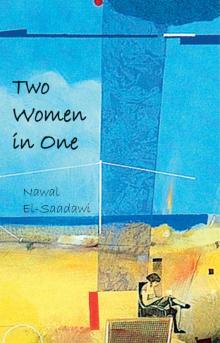 Two Women in One
Two Women in One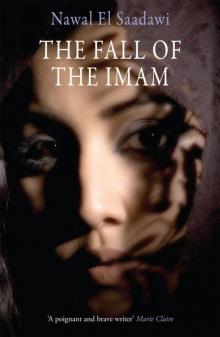 The Fall of the Imam
The Fall of the Imam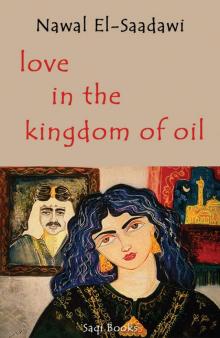 Love in the Kingdom of Oil
Love in the Kingdom of Oil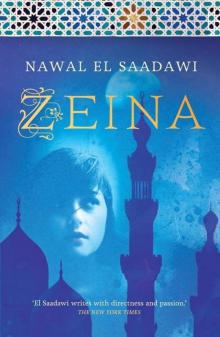 Zeina
Zeina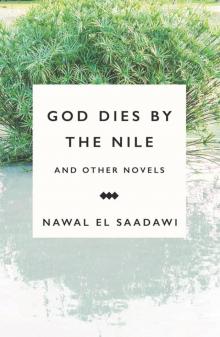 God Dies by the Nile and Other Novels
God Dies by the Nile and Other Novels